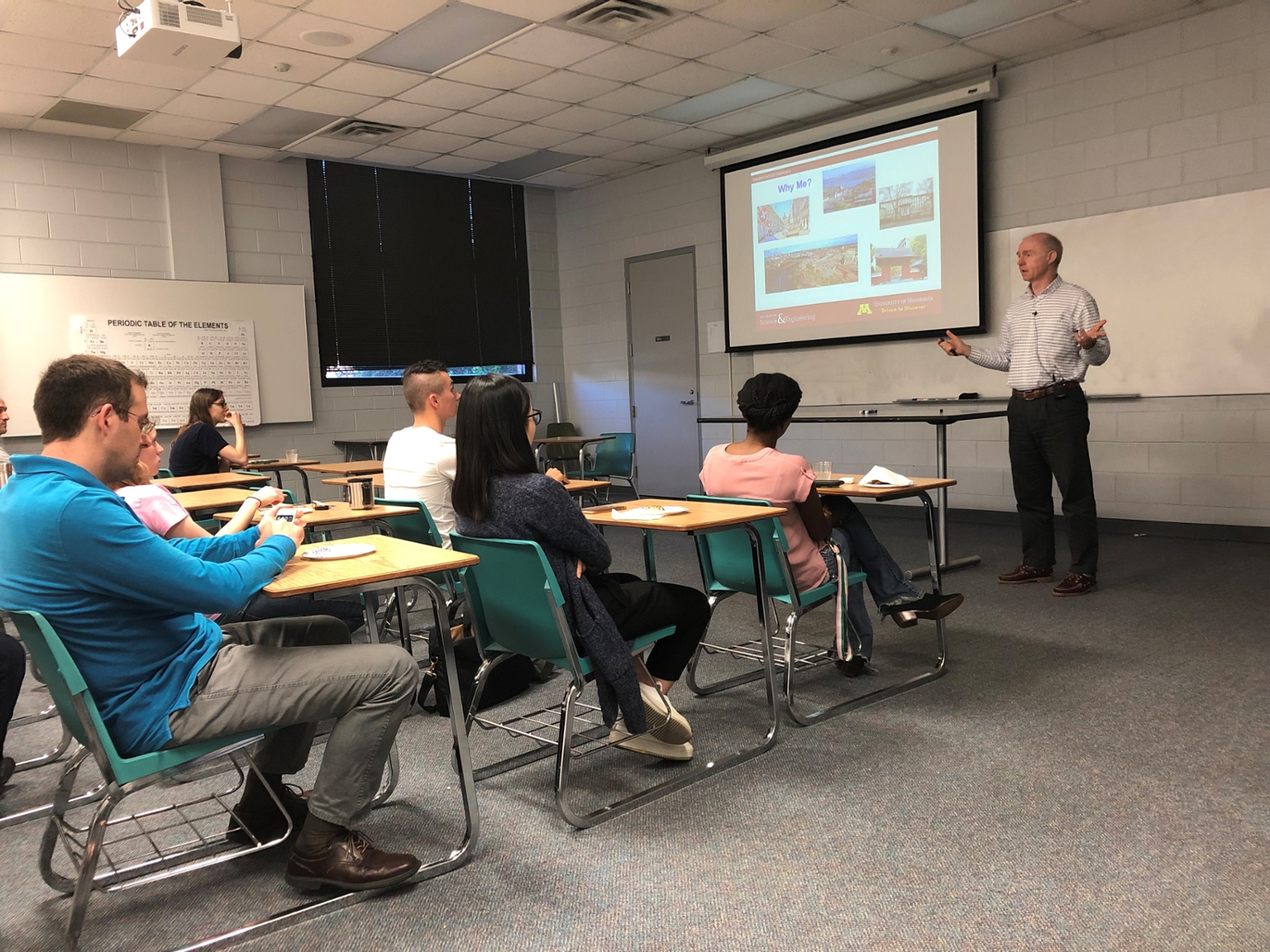COSAM News Articles 2019 May Department of Chemistry and Biochemistry Addresses Graduate Student Mental Health
Department of Chemistry and Biochemistry Addresses Graduate Student Mental Health
The Auburn University Younger Chemists Committee recently welcomed Dr. Phil Buhlmann, director of graduate studies at the University of Minnesota, as its Graduate Student Choice Speaker and Awardee. The committee hosted a chemistry colloquium on electrochemical sensors held on April 25 featuring Dr. Buhlmann, and Dr. Buhlmann presented a talk on April 26 focusing on “Addressing Stress and Mental Health in Chemistry Graduate Education.”
“The Younger Chemists Committee Chairs nominated Dr. Buhlmann for the student choice speaker because of his great success in making helpful changes to the UMN Chemistry Department as their director of graduate studies,” said Jessica Krewall, professional development chair for the Younger Chemists Committee.
The committee became aware of Dr. Buhlmann from an interview featuring him in an issue of “C&EN” (Chemistry and Engineering News) that focused on the mental health of graduate students. They then reached out to Dr. Buhlmann to possibly utilize some of the same initiatives he has used in his department throughout the Auburn University Department of Chemistry and Biochemistry.
During his presentation on addressing mental health among graduate students, Dr. Buhlmann spoke on his experience with observing mental health challenges. Throughout his career he said he noticed graduate students struggling, some even ending their life, and not many helpful resources were available for these students.
“In a strange way, I still didn’t feel that this was almost a theme that I had seen, like recurring movies through my life,” Dr. Buhlmann said. “But when I became assistant professor at the University of Minnesota, and when I had my own grad students and saw some of my grad students were struggling, I finally came to the realization that I can’t just go on ignoring this and say it was other people’s problems. It was now my problem.”
He said that he looked into taking a course on the subject, but none were available. When he became the director of graduate studies in 2012, he knew it was time to put a plan into action.
“I decided before I started that job that I wanted to do something about this,” he said. “I wanted this to be a focal point in being a director of grad studies. It became immediately clear to me that the whole university system and mental health services were geared towards undergraduate students. All of the programs were reactive and not proactive and graduate students have a different set of problems than undergraduate students.”
Dr. Buhlmann said recognizing what the stressors were for graduate students was the first step and then the department began to work to help alleviate some of these stressors. They worked with mental health professionals and created workshops on addressing stress and mental health that were available to the entire chemistry department. They also improved annual reviews of graduate students focusing on goals, held fourth-year milestone meetings, held stress and mental health training for teaching assistants, and appointed Mental Health Advocates in each department. This was followed by the formation of the Community of Chemistry Graduate Students, a support network for chemistry graduate students.
“We needed to first find out what bothered our grad students and then come up with ways to address them in a very professional approach, very logical, it’s like how you would solve a chemistry problem,” he said. “One in five adults in America experiences a mental health problem at some point. This is an important issue because it affects a lot of us and it affects a lot of us in the way of how productive we can be wherever we are.”
Krewall said that she felt it was important for Dr. Buhlmann to give his talk about stress and mental-health issues because the Department of Chemistry and Biochemistry, including students, faculty and staff, could use some information about this topic.
“We're all trying to figure out how to handle these topics well,” she said. “I think sometimes people expect that addressing these issues will create a graduate student body that is lethargic, unmotivated, or sub-par, but really what Dr. Buhlmann has shared is that addressing the areas of stress that can be addressed or changed can leave only the stresses of graduate school that can't be changed. As a result, the students can focus more on the actual goal of graduate school and not the distracting worries that are scattered along the long road to graduation.”
Krewall added that the Department of Chemistry and Biochemistry has already begun working towards change.
“We've surveyed our department to understand the greatest stresses of grad school for our department, and to address these issues with the types of events that we host,” she said. “Along with this, our Department Chair, Dr. Shannon, and our Graduate Program Officer, Dr. Goodwin, have been doing so much within the last few years to lower unnecessary stresses surrounding acceptance to graduate school and progression to your degree. My hope is that we can continue this process with increasing efficiency in the Department of Chemistry and Biochemistry, and then that the other colleges in COSAM can benefit from this process as well.”
Latest Headlines
-
02/12/2025
-
02/11/2025
-
02/10/2025
-
01/30/2025
-
12/03/2024

